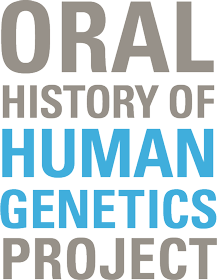We are creating a historical resource that will allow researchers now and in the future to gain new insights into the field of genetics as it developed in the second half of the twentieth century. This resource consists of:
A core group of 35 online oral histories with scientists, theorists, organizational leaders, and participants in ethical, legal, and social debates in the field of human genetics. and;
A website that enriches these oral histories through annotation and cross-reference and allows for flexible and user-friendly searching.
This resource will enable researchers at all levels of expertise and from multiple fields to readily locate the information of interest to them and point them toward new questions, new hypotheses, and new meanings of the materials. Because human genetics is not a scientific discipline alone, but also a subject of ethical and social importance, it is critical that the field’s historians continually reexamine its conceptual frameworks and remain aware of the bases and implications of its theory and practice. A meaningful history of genetics will suggest new directions for research, inform ethical debate, and inspire students. These are our hypotheses:
- The networks of collegial and mentoring relationships that created the fields of human genetics in the years 1950-2000 structured the ways in which new genetic knowledge was produced, shared, and translated into the current scientific understanding of the genome and the ethical, legal and social implications of that understanding.
- The scientific assumptions, working norms, craft knowledge, and methodologies formed during the development of this field have significantly shaped the present-day concepts and applications of genetic functioning, genetic variation, and mechanisms of evolution that inform the field in the 21st century.
- These assumptions, norms, knowledge, and methodologies have also structured the parameters of conditioned ethical, legal, and social debate on such questions as genetic privacy and autonomy, the value of species differences, the governance and financing of genetic research, and the meaning of self and identity in a genetically defined and manipulable species.
Much of the evidence that will support or refute these hypotheses is in grave danger of being lost to the historical record, with the passing of the original generation of field leaders and the relative paucity of written materials documenting ideas and events. Our project is designed to rescue this evidence before it is too late.
This material is based upon work supported by the National Science Foundation under Grant No. 0551068 and the National Human Genome Research Initiative under Grant No. 003206. Any opinions, findings, and conclusions or recommendations expressed in this material are those of the author(s) and do not necessarily reflect the views of the National Human Genome Research Initiative or of the National Science Foundation.
